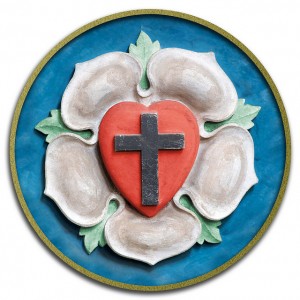Article XXVIII: Of Ecclesiastical Power (continued)
… continued from yesterday.
 34] But concerning this question it is taught on our part (as has been shown above) that bishops have no power to decree anything against the Gospel. The Canonical Laws teach the same thing (Dist. IX). 35] Now, it is against Scripture to establish or require the observance of any traditions, to the end that by such observance we may make satisfaction for sins, or merit grace and righteousness. 36] For the glory of Christ’s merit suffers injury when, by such observances, 37] we undertake to merit justification. But it is manifest that, by such belief, traditions have almost infinitely multiplied in the Church, the doctrine concerning faith and the righteousness of faith being meanwhile suppressed. For gradually more holy-days were made, fasts appointed, new ceremonies and services in honor of saints instituted, because the authors of such things thought that by these works they were meriting 38] grace. Thus in times past the Penitential Canons increased, whereof we still see some traces in the satisfactions.
34] But concerning this question it is taught on our part (as has been shown above) that bishops have no power to decree anything against the Gospel. The Canonical Laws teach the same thing (Dist. IX). 35] Now, it is against Scripture to establish or require the observance of any traditions, to the end that by such observance we may make satisfaction for sins, or merit grace and righteousness. 36] For the glory of Christ’s merit suffers injury when, by such observances, 37] we undertake to merit justification. But it is manifest that, by such belief, traditions have almost infinitely multiplied in the Church, the doctrine concerning faith and the righteousness of faith being meanwhile suppressed. For gradually more holy-days were made, fasts appointed, new ceremonies and services in honor of saints instituted, because the authors of such things thought that by these works they were meriting 38] grace. Thus in times past the Penitential Canons increased, whereof we still see some traces in the satisfactions.
39] Again, the authors of traditions do contrary to the command of God when they find matters of sin in foods, in days, and like things, and burden the Church with bondage of the law, as if there ought to be among Christians, in order to merit justification a service like the Levitical, the arrangement of which God had committed to the Apostles and bishops. 40] For thus some of them write; and the Pontiffs in some measure seem to be misled by the example 41] of the law of Moses. Hence are such burdens, as that they make it mortal sin, even without offense to others, to do manual labor on holy-days, a mortal sin to omit the Canonical Hours, that certain foods defile the conscience that fastings are works which appease God that sin in a reserved case cannot be forgiven but by the authority of him who reserved it; whereas the Canons themselves speak only of the reserving of the ecclesiastical penalty, and not of the reserving of the guilt.
42] Whence have the bishops the right to lay these traditions upon the Church for the ensnaring of consciences, when Peter, Acts 15:10, forbids to put a yoke upon the neck of the disciples, and Paul says, 2 Cor. 13:10, that the power given him was to edification not to destruction? Why, therefore, do they increase sins by these traditions?
43] But there are clear testimonies which prohibit the making of such traditions, as though they merited grace or were necessary to 44] salvation. Paul says, Col. 2:16-23: Let no man judge you in meat, or in drink, or in respect of an holy-day, or of the new moon, or of the Sabbath-days. 45] If ye be dead with Christ from the rudiments of the world, why, as though living in the world, are ye subject to ordinances (touch not; taste not; handle not, which all are to perish with the using) after the commandments and doctrines of men! which things have indeed a show of wisdom. 46] Also in Titus 1:14 he openly forbids traditions: Not giving heed to Jewish fables and commandments of men that turn from the truth.
47] And Christ, Matt. 15:14,13, says of those who require traditions: Let them alone; they be blind leaders of the blind; 48] and He rejects such services: Every plant which My heavenly Father hath not planted shall be plucked up.
49] If bishops have the right to burden churches with infinite traditions, and to ensnare consciences, why does Scripture so often prohibit to make, and to listen to, traditions? Why does it call them “doctrines of devils”? 1 Tim. 4:1. Did the Holy Ghost in vain forewarn of these things?
50] Since, therefore, ordinances instituted as things necessary, or with an opinion of meriting grace, are contrary to the Gospel, it follows that it is not lawful for any bishop 51] to institute or exact such services. For it is necessary that the doctrine of Christian liberty be preserved in the churches, namely, that the bondage of the Law is not necessary to justification, as it is written in the Epistle to the Galatians 5:1: Be not entangled again with the yoke of bondage. 52] It is necessary that the chief article of the Gospel be preserved, to wit, that we obtain grace freely by faith in Christ, and not for certain observances or acts of worship devised by men.
53] What, then, are we to think of the Sunday and like rites in the house of God? To this we answer that it is lawful for bishops or pastors to make ordinances that things be done orderly in the Church, not that thereby we should merit grace or make satisfaction for sins, or that consciences be bound to judge them necessary services, and to think that it is a sin to break them 54] without offense to others. So Paul ordains, 1 Cor. 11:5, that women should cover their heads in the congregation, 1 Cor. 14:30, that interpreters be heard in order in the church, etc.
55] It is proper that the churches should keep such ordinances for the sake of love and tranquillity, so far that one do not offend another, that all things be done in the churches in order, and without confusion, 1 Cor. 14:40; comp. Phil. 2:14 . 56] but so that consciences be not burdened to think that they are necessary to salvation, or to judge that they sin when they break them without offense to others; as no one will say that a woman sins who goes out in public with her head uncovered provided only that no offense be given.
57] Of this kind is the observance of the Lord’s Day, Easter, Pentecost, and like holy-days and 58] rites. For those who judge that by the authority of the Church the observance of the Lord’s Day instead of the Sabbath-day was ordained as a thing necessary, 59] do greatly err. Scripture has abrogated the Sabbath-day; for it teaches that, since the Gospel has been revealed, all the ceremonies of Moses can be omitted. And 60] yet, because it was necessary to appoint a certain day, that the people might know when they ought to come together, it appears that the Church designated the Lord’s Day for this purpose; and this day seems to have been chosen all the more for this additional reason, that men might have an example of Christian liberty, and might know that the keeping neither of the Sabbath nor of any other day is necessary.
61] There are monstrous disputations concerning the changing of the law, the ceremonies of the new law, the changing of the Sabbath-day, which all have sprung from the false belief that there must needs be in the Church a service like to the Levitical, and that Christ had given commission to the Apostles and bishops to devise new ceremonies as necessary to 62] salvation. These errors crept into the Church when the righteousness of faith was not taught clearly enough. 63] Some dispute that the keeping of the Lord’s Day is not indeed of divine right, but in a manner so. They prescribe concerning holy-days, how far it is lawful to work. What else 64] are such disputations than snares of consciences? For although they endeavor to modify the traditions, yet the mitigation can never be perceived as long as the opinion remains that they are necessary, which must needs remain where the righteousness of faith and Christian liberty are not known.
65] The Apostles commanded Acts 15:20 to abstain from blood. Who does now observe it? And yet they that do it not sin not; for not even the Apostles themselves wanted to burden consciences with such bondage; but they forbade it for a time, to avoid offense. 66] For in this decree we must perpetually consider what the aim of the Gospel is.
67] Scarcely any Canons are kept with exactness, and from day to day many go out of use even among those who are the most zealous advocates of traditions. 68] Neither can due regard be paid to consciences unless this mitigation be observed, that we know that the Canons are kept without holding them to be necessary, and that no harm is done consciences, even though traditions go out of use.
69] But the bishops might easily retain the lawful obedience of the people if they would not insist upon the observance of such traditions as cannot be kept with a good conscience. 70] Now they command celibacy; they admit none unless they swear that they will not teach 71] the pure doctrine of the Gospel. The churches do not ask that the bishops should restore concord at the expense of their honor; which, nevertheless, 72] it would be proper for good pastors to do. They ask only that they would release unjust burdens which are new and have been received contrary to the custom of the Church Catholic. 73] It may be that in the beginning there were plausible reasons for some of these ordinances; and yet they are not adapted to later times. 74] It is also evident that some were adopted through erroneous conceptions. Therefore it would be befitting the clemency of the Pontiffs to mitigate them now, because such a modification does not shake the unity of the Church. For many human traditions have been changed in process of time, 75] as the Canons themselves show. But if it be impossible to obtain a mitigation of such observances as cannot be kept without sin, we are bound to follow the apostolic rule, Acts 5:29, which commands us to obey God rather than men.
76] Peter, 1 Pet. 5:3, forbids bishops to be lords, and to rule over the churches. 77] It is not our design now to wrest the government from the bishops, but this one thing is asked, namely, that they allow the Gospel to be purely taught, and that they relax some few observances which 78] cannot be kept without sin. But if they make no concession, it is for them to see how they shall give account to God for furnishing, by their obstinacy, a cause for schism.
(Source)
Photo source. Some rights reserved.



